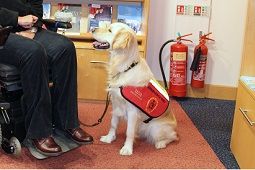Welcoming Assistance Dogs!
As a restaurant or takeaway, your business plays a key role in making the communities you’re based in more inclusive. Under the Equality Act 2010, refusing access to a disabled person with their assistance dog is illegal. This applies to all businesses and service providers, regardless of size. But this is about more than avoiding a legal problem – it’s about creating a welcoming environment where every customer feels valued and respected. An access refusal isn’t just an inconvenience; for assistance dog handlers, it can have a lasting impact, undermining independence, harming emotional wellbeing, and making everyday life more difficult.
We know most refusals aren’t about bad intentions – they happen because staff aren’t sure what the rules are or how to handle the situation.
Getting it right means a warm welcome, confident staff, and customers who leave feeling valued. But what about when someone is refused? Refusals can cause embarrassment, anxiety, and feelings of isolation. Over time, repeated incidents can chip away at a person’s confidence to go out, to visit new places, or even to return to places they’ve been before. For many assistance dog handlers, this isn’t a rare or occasional worry – it’s a constant consideration.
ADUK Ambassador Emily knows exactly how that feels. She says: "Whenever I go out with my assistance dog, there's always a voice in the back of my mind worrying about an access refusal. Sadly, they’re far too common. Even places I’ve visited many times without issue can suddenly change – new staff, a different attitude, and suddenly I’m being challenged.
The hardest part is when the refusal happens publicly, with someone asking personal questions or saying things like ‘you don’t look like you need help.’ I have a hidden disability, and being forced to justify myself in front of strangers is incredibly distressing.
Early on, these experiences were overwhelming. My anxiety would spike, triggering my assistance dog Nieve to alert – and I’d often leave rather than face the confrontation.”
ADUK Ambassador Martin adds. “If you struggle to communicate, if you have mobility problems, if you have a medical condition that may mean you may need help, the prospect of going out can be difficult, whilst the idea of entering a strange environment can be very off-putting. With an Assistance Dog by your side, those concerns and fears disappear. You have a companion who will look after you and will alert you in the event of an emergency.”
Getting it right doesn’t have to be complicated – and ADUK is there to help!
A few simple steps can make a big difference:
• Make sure all staff know the law on assistance dog access.
• Avoid asking for proof of disability or Assistance Dog ID (there is no legal ID)
• Remember that not all disabilities are visible.
• Focus on providing the same warm welcome you would give any other customer.
No one should be turned away simply for relying on an assistance dog. Together, we can make sure that doesn’t happen.



